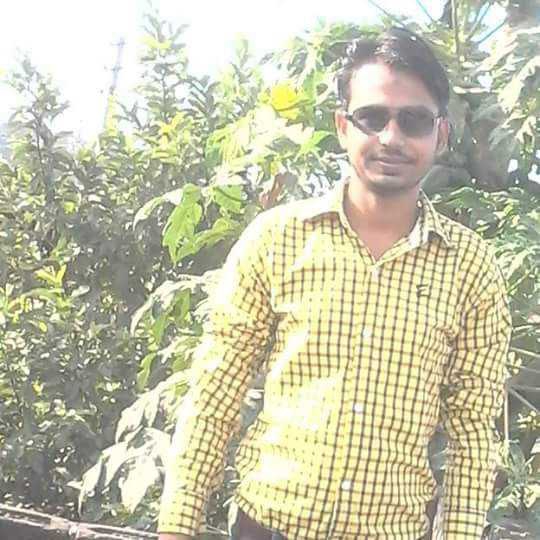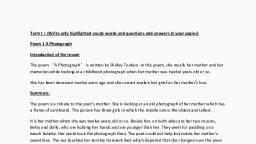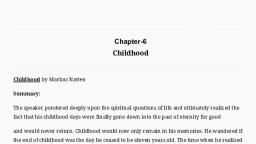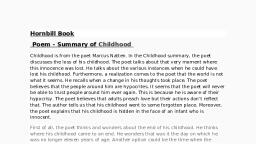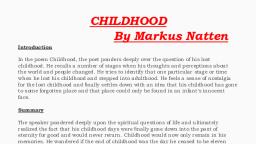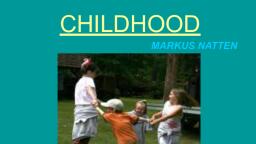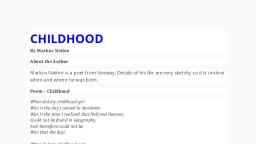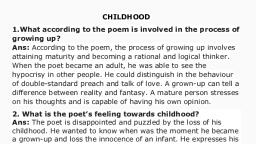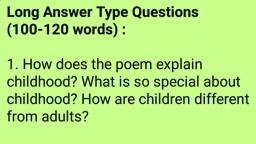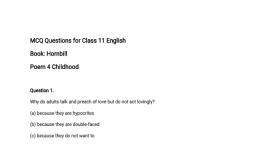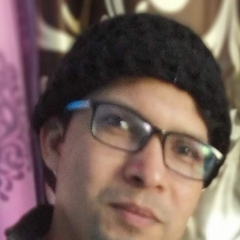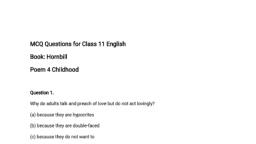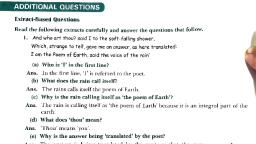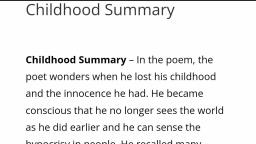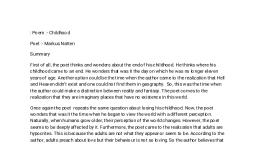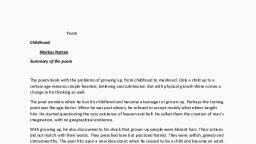Page 1 :
184, 4, Childhood, (Markus Natten), tennant ttt, ABOUT THE POEM, Introduction, , The poem "Childhood" deals with the poet's curiosity to know when, actually an individual ceases to be a child. He wonders whether it is, the age or the stage when the young, unsullied mind learns to see, , , , through the adults' hypocrisy and identifies his own distinctiveness., Childhood disappears to hide itself in an infant's innocent expression., , | \ Summary, , ‘The process of growing from a child to an adolescent and then to an, , ' adult is an impalpable one. However one fine day one realises that, one has left behind the childhood and one has stepped into the world, of adolescence and adulthood. There is no line of demarcation, between the various stages. The poet wonders whether it is a span of, years or the process of losing innocence and outgrowing gullibility,, seeing through others' hypocrisy and craftiness or acquiring an, individuality which spells the cessation of childhood. Somewhat, satisfied with his analysis, the poet takes up the next question as to, where his childhood has disappeared. He concludes that childhood, resides in an infant's face i.e. childhood is the abode of innocence. The, moment one loses innocence, one ceases to bea child., , THEME, , The poem deals with the theme of the loss of childhood because of, psycho-physical growth, development of thought and the influence, of the worldly ways. Disillusioned with the hypocritical ways of the, , adult world, the poet bemoans the loss of his childhood because it also, , Tesulted j :, d in the loss of innocence. However, one positive outcome of, , this loss is that the poet has discovered his ability to think new, , Scanned with CamScanner, , eo
Page 2 :
pratt Companion 11, ; 185, , noughts independently and the individuality and uniqueness of his, peing, , COMMENTARY, Jrealized that Hell and Heaven,, , Could not be found in Geography, , According to a child's definition, geography is a study of places., , Since there is no mention of Heaven and Hell in his geography, , text book, he rationally concludes that they do not exist anywhere., , [found my mind was really mine, , In the process of growing up the child discovers his individuality, , and finds himself to be unique. He comes to trust has ability to, , reasonand think., , « Touse whichever way I choose, As the child grows, he develops a bit of defiance arci he becomes, , assertive. Apart from it he becomes aware of his distinctive, , character., , . Itwentto some forgotten place, , The poet does not know where and when he lost his childhood, , but it was definitely within him once upon a time, He does not, , know where he has mislaid it. Even the recollection of it has faded, , away with passage of time., , , , renee, , Scanned with CamScanner
Page 3 :
18h, , When did my childhood go?, , Was it the day I ceased to be eleven,, , Was it the time I realized that Hell and Heaven,, Could not be found in Geography,, , And therefore could not be,, , Was that the day!, , SET-1 (Answer in one ortwolines), , (a), , (b), , (c), , Literature Companion, 1, STANZAS FOR COMPREHENSION, Read the following extracts and answer the, , questions that follow ., , (1), , What different possibilities according to the pore are instrumental, in the cessation of childhood? :, There are various possibilities that might be responsible fe the, cessation of the poet's childhood - one, growth in terms of, years; two, development of rational thought and spirit of, enquiry; three, realization of the falsehood and hypocrisy of, the adult world. ', What specific point of time according to the poet's conjecture, spells the end of childhood?, , The poet wonders whether the waning of childhood is related, to the number of years one has lived. He questions whether one, , , , leaves behind childhood when one turns twelve., , How does a scientific approach of the child transform his, thinking?, , Doubt starts creeping in the child's mind as he develops @, , scientific approach. He comes out of his make-believe world of, , imagination and hearsay and starts leaving behind his, childhood. , , , Scanned with CamScanner
Page 4 :
ion 11, tute Companion, pier 187, , a What as the child doubt the existence of Hell and Heaven?, According toa child's definition geography isa study of places, Since there is no mention of Heaven and Hell in his geography, , text book, he rationally concludes that they do not exist, anywhere., , sET-II (Choose the most appropriate option), , (a) What intrigues the poet?, (i) Heavenand Hell, (ii) the Geography books, (iii) the pre-teenage period, (iv) the question when one ceases to bea child, (iv) the question when one ceases to bea child, (b) Why can't Heaven and Hell be found in Geography books?, (i) because of the enormous distance between them, (ii) because of their enormous size, (iii) because abstract ideas cannot be covered by Geography, (iv) because they are not located on the earth, (iii) because abstract ideas cannot be covered by Geography, () What does the mark of exclamation at the end of the stanza, indicate in the poet's mind?, (i) surprise (iii) confusion, ’ Gi) anger (iv) confidence, (iii) confusion, (a) When the child doesn't find Heaven and Hell in Geography, books, what does heconclude?, (i) thatHeavenand Hell don'texist, (ii) thatGeography books are not authentic, (iii) thathe is too young to look for them in his books, (iv) thatsome pages were missing fr ombhis Geography books, , () that Heavenand Hell don't exist, , , , , , Scanned with CamScanner
Page 5 :
o, , 7, , SNe, , sore, , 188, , Literature Companion 1, . 1, (qn) a, , i i d go?, When did my childhood g, Was it the time I realized that adults were not, , all they seemed to be,, , They talked of love and preached of love,, But did not act so lovingly,, , Was that the day!, , SET=1 (Answer in one ortwolines), , (a) | Whatdid the child observe about the adults?, The child finds the adults to be double-faced. He observes a, wide gap between what they preach and what they practice,, Hypocricy has taken the place of innocence in their life., , (b) | What idea do you get about the child who learns to see through, hypocrisy of the adult?, The child is heading towards worldly maturity. The gullibility, which made him accept things at their face value is giving way, toakeenandacrisp perception., , (c) Whois'I'in the stanza?, Tis the poet who represents the children whose childhood is, giving way to adolescence, ‘, , (4) Which'day'is the poet talking about?, , The poet is talking about the day that spelt the end of his’, childhood., , SET=I1 (Choose the most appropriate Option) —, , ib}, (a) "Adults werenotall they seemed to be", (i) they wereas innocentas children, Gi) they wereas fun loving as childr, (iii) they were double-faced, (iv) they hated Geo, (iii) they were doub, , means, are, en are, , etaphy as muchas children did :, le-faced: :, , , , , , Scanned with Cam:
